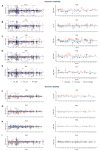Genomic Instability in Cerebrospinal Fluid Cell-Free DNA Predicts Poor Prognosis in Solid Tumor Patients with Meningeal Metastasis
- PMID: 36291812
- PMCID: PMC9600191
- DOI: 10.3390/cancers14205028
Genomic Instability in Cerebrospinal Fluid Cell-Free DNA Predicts Poor Prognosis in Solid Tumor Patients with Meningeal Metastasis
Abstract
Genomic instability (GI), which leads to the accumulation of DNA loss, gain, and rearrangement, is a hallmark of many cancers such as lung cancer, breast cancer, and colon cancer. However, the clinical significance of GI has not been systematically studied in the meningeal metastasis (MM) of solid tumors. Here, we collected both cerebrospinal fluid (CSF) and plasma samples from 56 solid tumor MM patients and isolated cell-free ctDNA to investigate the GI status using a next-generation sequencing-based comprehensive genomic profiling of 543 cancer-related genes. According to the unfiltered heterozygous mutation data-derived GI score, we found that 37 (66.1%) cases of CSF and 3 cases (6%) of plasma had a high GI status, which was further validated by low-depth whole-genome sequencing analysis. It is demonstrated that a high GI status in CSF was associated with poor prognosis, high intracranial pressure, and low Karnofsky performance status scores. More notably, a high GI status was an independent poor prognostic factor of poor MM-free survival and overall survival in lung adenocarcinoma MM patients. Furthermore, high occurrences of the co-mutation of TP53/EGFR, TP53/RB1, TP53/ERBB2, and TP53/KMT2C were found in MM patients with a high GI status. In summary, the GI status in CSF ctDNA might be a valuable prognostic indicator in solid tumor patients with MM.
Keywords: cell-free DNA; cerebrospinal fluid; genomic instability; meningeal metastases; plasma.
Conflict of interest statement
The authors declare no conflict of interest.
Figures






References
-
- Chamberlain M., Soffietti R., Raizer J., Rudà R., Brandsma D., Boogerd W., Taillibert S., Groves M.D., le Rhun E., Junck L., et al. Leptomeningeal metastasis: A Response Assessment in Neuro-Oncology critical review of endpoints and response criteria of published randomized clinical trials. Neuro-Oncology. 2014;16:1176–1185. doi: 10.1093/neuonc/nou089. - DOI - PMC - PubMed
-
- Yamaguchi H., Wakuda K., Fukuda M., Kenmotsu H., Mukae H., Ito K., Chibana K., Inoue K., Miura S., Tanaka K., et al. A Phase II Study of Osimertinib for Radiotherapy-Naive Central Nervous System Metastasis From NSCLC: Results for the T790M Cohort of the OCEAN Study (LOGIK1603/WJOG9116L) J. Thorac. Oncol. 2021;16:2121–2132. doi: 10.1016/j.jtho.2021.07.026. - DOI - PubMed
Grants and funding
- 82173198, 82072588, 82002601, and 81872143/National Natural Science Foundation of China
- 2018ZX09201015/National Science and Technology Support Program of China
- TJWJ2022QN013/Tianjin Health Research Project
- 18JCQNJC82700/Project of Science and Technology of Tianjin
- TJYXZDXK-009A/Tianjin Key Medical Discipline(Specialty) Construction Project
LinkOut - more resources
Full Text Sources
Research Materials
Miscellaneous

